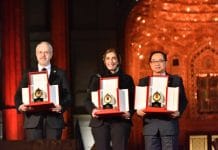KUALA LUMPUR : The 17th International Conference on Pseudomonas was hosted here for the first time. The five-day conference was attended by 200 exceptional scientists from 31 countries with the most novel and intriguing research on Pseudomonas.
Co-hosted by the Academic Nexus for Global Scholastic Activities (Angsa) and the Malaysian Biotechnology Information Centre (Mabic), the conference was in a large sense unique, as it was entirely devoted to just one specific bacteria.
Pof Kalai Mathee (pix) , conference Chair, Pseudomonas 2019 and editor-in-chief, Journal of Medical Microbiology, and professor at the Florida International University said: ”The Pseudomonas 2019 meeting has created an excellent balance of the coverage of various species of Pseudomonas and their role, disease mechanisms, and participation of young and old generations from all over the world.”
The conference, on the first day, hosted plenary speaker Prof Shahriar Mobashery from the Department of Chemistry and Biochemistry, University of Notre Dame, South Bend, USA. Mobashery is also the winner of the 2019 Emil Thomas Kaiser Award for his contribution in understanding of cell-wall recycling in Pseudomonas aeruginosa, which was the subject of his talk. “Beta-lactam antibiotics work by preventing bacteria from keeping up with the necessary cell-wall building and repairs,” Mobashery pointed out.
“However, bacteria have evolved ways to fight back. As bacterial cells grow and divide, they constantly rebuild and remodel their cell walls. Fragments from torn-down sections are recycled to form new cell-wall-building materials.
“By uncovering the step-by-step details of the recycling process and identifying molecules that trigger resistance, we hope to find new antibiotic targets that are less likely to be evaded by microbial evolution,” he said. Throughout the conference, various researchers, from all over the world, presented their work regarding environmental sensing, metabolism, physiology, gene regulation and most notably on the issue at hand, antimicrobial resistance.
The conference also covered the pathogenicity of Pseudomonads in plants, with topics such as inter-species signaling in plant associated bacteria and Pseudomonas syringae’s role in minimising plant immune activation, being discussed, along with talks on bioremediation Pseudomonads.
Pseudomonas is deemed to be one of the bacterial genera presenting a major concern due to the fast-paced development of antimicrobial resistance upon exposure to certain antibacterial agents.
According to the World Health Organisation’s Antimicrobial Resistance Global Report on Surveillance, a post-antibiotic era, in which common infections can prove fatal is a very realistic possibility in the 21st century.
Kalai Mathee said: “The quality of science in the conference was particularly excellent with the crème de la crème of the field and the upcoming movers and shakers from the top universities in the world such as Cambridge, Harvard, and Columbia getting together to facilitate the exchange of information regarding top notch research on Pseudomonads.
“What you will see at such conferences are ‘what are the newest technologies?’, ‘what are the new ways to do science?’, and ‘what are the critical questions that are being asked in the field?
“The problem is that if you don’t move with science, then you will not progress and therefore, you cannot publish, and attending such conferences enlightens you on what the next big question is, and how to answer these questions.”, said Kalai Mathee, when asked about the vitality of keeping up with science and scientific advancements for Asian and other developing countries. Even though the limelight was on science and scientific networking, it had a socio-cultural touch as well, with various Malaysian cultural performances, food, and even a tour of Kuala Lumpur for the conference guests.
Kalai Mathee, a Malaysian who has been out of the country for the last 33 years is committed to showcasing Malaysia and its culture to her fellow scientists.
“I had to wait 20 years to bring it to Malaysia. At this point it (hosting the conference) is the ultimate acceptance from the community that you have attained the caliber of science that everyone in the field respects in order to let you organise the meeting, so it really is the biggest feather on my cap.
“I wanted to show everyone what a beautiful country and culture we have, to showcase who we are, what are our values, our diversity, our food, and the way we live.” She added, expressing her personal incentives for bringing the Pseudomonas conference to Malaysia.
















